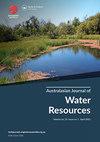认识到城市径流和再生水对墨尔本文化流动的价值:通过规划方案实施
IF 2.2
Q2 WATER RESOURCES
引用次数: 1
摘要
在澳大利亚,关于水资源利用的争论一直很激烈,而且这些争论已经延伸到区域城市和城市首府。2008年,墨累河下游达令土著民族发表了《埃丘卡宣言》,呼吁将这些水资源的一部分合法、有效地归第一民族所有,并享有将这些资源用于经济解放的相关权利——即“文化流动”。这是必要的,因为墨累-达令盆地的第一民族在寻求对其水的文化权利的法律承认时遇到了不足;但正如文献所示,这些困难并不仅仅是墨累-达令盆地第一民族所特有的。澳大利亚各地的原住民都面临着类似的问题,尤其是在澳大利亚的城市。关于如何在城市中获取文化流动,或如何利用循环水和处理过的城市雨水径流来实现土著社区制定的文化水管理目标的研究有限。本研究以维多利亚规划方案为中心,旨在通过对循环水和城市雨水径流治理的政策分析来弥合这一差距。从这里开始,我们将讨论如何实施这种方法。”本文章由计算机程序翻译,如有差异,请以英文原文为准。
Recognising the value of urban runoff and reclaimed water for cultural flows in melbourne: implementation through the planning scheme
ABSTRACT In Australia, contestation over the use of water resources remains fierce and these contests extends into regional cities and urban capitals. The 2008 Echuca Declaration by the Murray Lower Darling Indigenous Nations called for a share of these water entitlements to be legally and beneficially owned by First Nations with an associated right to use such resources for economic liberation – termed as ‘Cultural Flows’. This was necessary because of the inadequacies First Nations of the Murray–Darling Basin encountered when seeking legal recognition of their cultural rights to water; but as the literature has shown these difficulties are not unique to just First Nations of the Murray–Darling Basin. Similar problems confront First Nations throughout Australia, especially so in urban Australia. There is limited research into how Cultural Flows can be procured in cities, or how recycled water and treated urban stormwater runoff might have a part to play in the achievement of cultural water management objectives set by Indigenous communities. Centred on the Victorian planning scheme, this research aims to bridge this gap through a policy analysis of recycled water and urban stormwater runoff governance. From here, how this approach might be implemented is discussed.’
求助全文
通过发布文献求助,成功后即可免费获取论文全文。
去求助
来源期刊

Australasian Journal of Water Resources
WATER RESOURCES-
CiteScore
5.10
自引率
21.90%
发文量
25
期刊介绍:
The Australasian Journal of Water Resources ( AJWR) is a multi-disciplinary regional journal dedicated to scholarship, professional practice and discussion on water resources planning, management and policy. Its primary geographic focus is on Australia, New Zealand and the Pacific Islands. Papers from outside this region will also be welcomed if they contribute to an understanding of water resources issues in the region. Such contributions could be due to innovations applicable to the Australasian water community, or where clear linkages between studies in other parts of the world are linked to important issues or water planning, management, development and policy challenges in Australasia. These could include papers on global issues where Australasian impacts are clearly identified.
 求助内容:
求助内容: 应助结果提醒方式:
应助结果提醒方式:


